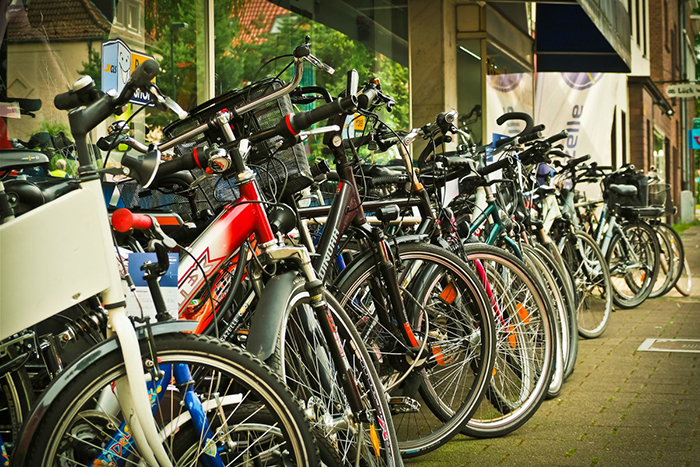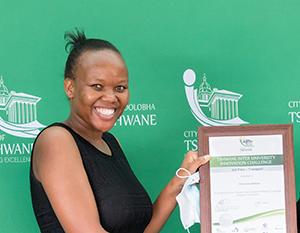News & Events
How pedal power could solve Tshwane’s traffic jams
Picture the scene: instead of gridlock at every intersection, traffic in the City of Tshwane’s central business district runs smoothly and easily. An unusually large number of cyclists can be seen out and about, not because there is a race on but because people choose to hop on one of the many “BCycle” rental bicycles available in the CBD.

This calmer, congestion-free CBD is what Unisa BSc student Nkamogeleng Matloga has in mind for the City of Tshwane, and she is convinced it can be achieved through BCycle – the brand name of the bicycle rental business she is getting off the ground after winning third place in the transportation category of the recent Tshwane InterUniversity Innovation Challenge.
The Challenge, held for the first time in November 2020, seeks to encourage students from Unisa, the Tshwane University of Technology and the University of Pretoria to help come up with solutions to service delivery problems, particularly around transport, energy and electricity, revenue collection and waste management.

Nkamogeleng Matloga won third place in the transportation category of the recent Tshwane InterUniversity Innovation Challenge
“My aim with BCycle is to reduce the number of taxis and cars in the CBD by introducing bicycles, and I think young people would be open to this,” says Nkamogeleng, pointing out that the city centre has three big university campuses and various colleges and high schools. “People walk a lot to get to the taxis and it could be easier and cheaper to get around on a bicycle.”
She has thought this through carefully and has a detailed business plan for BCycle, which harnesses pedal power and smartphone technology. Here’s how it would work:
Bicycle parks or stations would be strategically placed around the CBD for the convenience of customers. Anyone wishing to ride one of the bicycles would use an app to unlock the bike of their choice and pay for it. The cyclist concerned would then ride to the bicycle station nearest to their chosen destination and drop off the bicycle there.
The biggest challenge this plan would face would be theft, Nkamogeleng says, so BCycle’s bicycles would be locked into thief-proof steel racks when not in use. They would also be fitted with tracking devices so that their whereabouts can be traced at all times.
Another challenge would be the safety of cyclists on the roads. In the longer term, the solution would be for the City to build bicycle lanes in the CBD but, in the meantime, the safest and easiest places to put her idea to the test would be at campuses close to town. “This would help to get the vibe going and see if people are going to get excited about a bicycle service,” she says.
As winner of the third prize in the transportation category, Nkamogeleng receives access to incubation services and R50 000 in seed funding for a pilot project for the City of Tshwane.
Nkamogeleng is raring to get going with her pilot project but jokes that there might be one thing missing in her plans to get Tshwane residents cycling: she herself is not a cyclist. “I think I should start!”
* Submitted by the Research Support Directorate
Publish date: 2021-01-18 00:00:00.0

